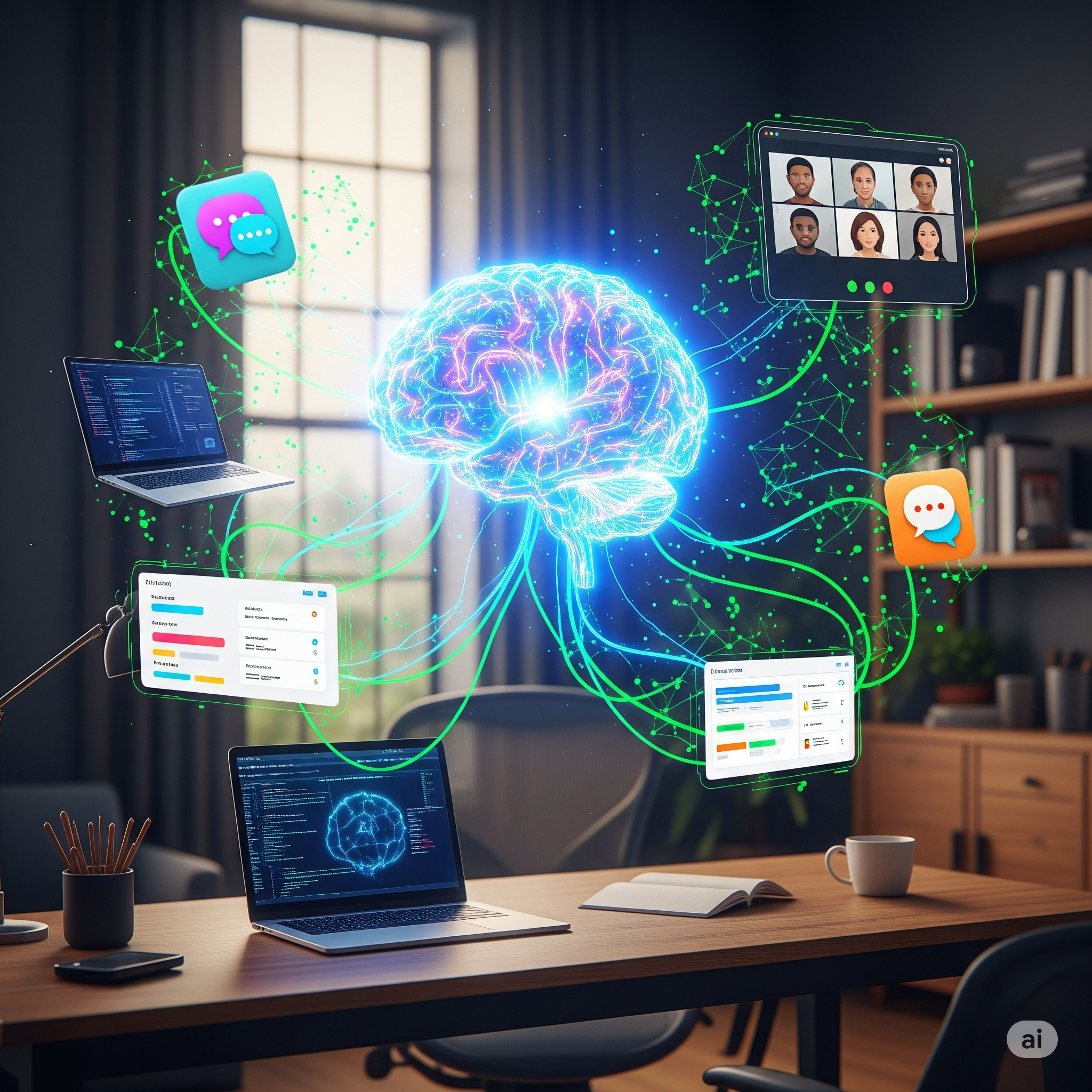Remote work has transitioned from a perk to a prevalent model for many businesses. While offering flexibility and autonomy, it also presents unique challenges in maintaining productivity, communication, and focus. Fortunately, artificial intelligence (AI) is providing a powerful suite of tools that can help remote workers overcome these hurdles and thrive in their distributed environments.
From intelligent task management to AI-powered communication aids, these technologies are transforming how we work remotely, enabling greater efficiency and a better work-life balance. This article will explore some of the best AI-driven tools that can help remote workers stay productive and connected.
Table of Contents
- AI-Powered Task Management and Organization
- Intelligent Communication and Collaboration Tools
- AI for Time Management and Focus Enhancement
- AI-Driven Meeting Assistance
- AI for Remote Team Building and Engagement
- AI in Cybersecurity for Remote Workers
- Choosing the Right AI Tools for Your Remote Work Setup
- Conclusion: Leveraging AI for Remote Work Success
- FAQ: Your Questions About AI Tools for Remote Work Productivity Answered
AI-Powered Task Management and Organization
Staying organized and managing tasks effectively is crucial in a remote work setting. AI-powered task management tools can help remote workers prioritize, schedule, and track their work more efficiently.
- Intelligent Prioritization: AI algorithms can analyze deadlines, dependencies, and your work habits to suggest the most important tasks to focus on.
- Smart Scheduling: Some AI tools can help you schedule tasks and meetings based on your availability and optimal work times, maximizing productivity.
- Automated Progress Tracking: AI can monitor your progress on tasks and provide insights into your productivity patterns, helping you identify areas for improvement.
Intelligent Communication and Collaboration Tools
Maintaining clear and efficient communication is vital for remote teams. AI-powered communication and collaboration tools can enhance these interactions.
- AI-Enhanced Messaging Platforms: Some messaging apps offer AI features like smart replies, grammar and spelling checks, and sentiment analysis to improve communication clarity and tone.
- Intelligent File Management: AI can help organize and search through shared files, making it easier for remote teams to find the information they need quickly.
- Real-Time Translation: AI-powered translation tools can facilitate communication among remote team members who speak different languages.
AI for Time Management and Focus Enhancement
Distractions can be a significant challenge for remote workers. AI tools can help manage time effectively and enhance focus.
- AI-Powered Focus Apps: Some apps use AI to block distracting websites and notifications during focused work sessions.
- Time Tracking and Analysis: AI can automatically track how you spend your time on different tasks, providing valuable insights into your productivity and helping you identify time-wasting activities.
- Smart Reminders and Breaks: AI can learn your work patterns and suggest optimal times for breaks to prevent burnout and maintain focus.
AI-Driven Meeting Assistance
Remote meetings can sometimes be less engaging and productive than in-person meetings. AI tools can help make them more effective.
- AI-Powered Transcription and Summarization: Some meeting platforms offer AI-driven transcription services that can automatically generate meeting minutes and summaries, allowing participants to focus on the discussion.
- Action Item Detection: AI can identify action items discussed during meetings and automatically assign them to relevant team members.
- Meeting Sentiment Analysis: AI can analyze the sentiment of the conversation during a meeting, providing insights into team engagement and potential areas of concern.
AI for Remote Team Building and Engagement
Maintaining a strong sense of team cohesion can be challenging in a remote environment. AI tools can help foster connections and engagement.
- AI-Powered Icebreakers and Team Activities: Some platforms offer AI-driven suggestions for virtual icebreakers and team-building activities.
- Sentiment Analysis of Team Communication: AI can analyze team communication to identify potential issues with morale or collaboration.
AI in Cybersecurity for Remote Workers
Remote work can increase cybersecurity risks. AI-powered security tools can help protect remote workers and company data.
- AI-Enhanced Threat Detection: AI can analyze network activity and identify potential security threats more effectively than traditional methods.
- Adaptive Authentication: AI can learn user behavior patterns to detect unusual login attempts and enhance authentication security.
Choosing the Right AI Tools for Your Remote Work Setup
The best AI tools for remote work productivity will depend on your specific needs and work style. Consider the following when making your choices:
- Identify Your Pain Points: Determine the biggest challenges you face in your remote work routine, such as task management, communication, or focus.
- Research Available Tools: Explore different AI-powered tools that address your specific pain points.
- Consider Integration: Choose tools that integrate seamlessly with your existing workflow and other applications you use.
- Try Free Trials: Many AI tools offer free trials, allowing you to test their features and see if they are a good fit for you.
- Read Reviews and Get Recommendations: See what other remote workers are saying about the tools you are considering.
Conclusion: Leveraging AI for Remote Work Success
AI offers a powerful arsenal of tools that can significantly enhance productivity and well-being for remote workers. By leveraging intelligent task management, communication aids, focus enhancers, and meeting assistants, individuals and teams can overcome the challenges of remote work and thrive in their distributed environments. As AI continues to evolve, we can expect even more innovative solutions that will further redefine the landscape of remote work.
FAQ: Your Questions About AI Tools for Remote Work Productivity Answered
Q1: Can AI really help me focus better while working remotely? Yes, AI-powered focus apps can block distractions, track your time, and suggest optimal break times to help you stay on task.
Q2: What are some examples of AI-powered communication tools for remote teams? Examples include messaging platforms with smart reply features and AI-driven translation services.
Q3: How can AI help with managing my tasks when working from home? AI task management tools can prioritize your tasks, schedule them efficiently, and track your progress automatically.
Q4: Are AI-powered meeting tools effective for remote teams? Yes, AI can provide real-time transcription, meeting summaries, and action item detection, making remote meetings more productive.
Q5: How does AI enhance cybersecurity for remote workers? AI can improve threat detection and implement adaptive authentication measures to protect remote workers and company data.
Q6: Is it expensive to use AI tools for remote work? Many AI tools offer free or freemium versions, and the cost of paid subscriptions can often be justified by the increase in productivity and efficiency.
Q7: How do I choose the right AI tools for my remote work needs? Identify your biggest challenges, research tools that address those challenges, consider integration with your existing workflow, and take advantage of free trials.
Q8: Will AI eventually manage all aspects of remote work? While AI can automate and enhance many aspects of remote work, human interaction, creativity, and emotional intelligence will remain essential components of successful remote teams.





